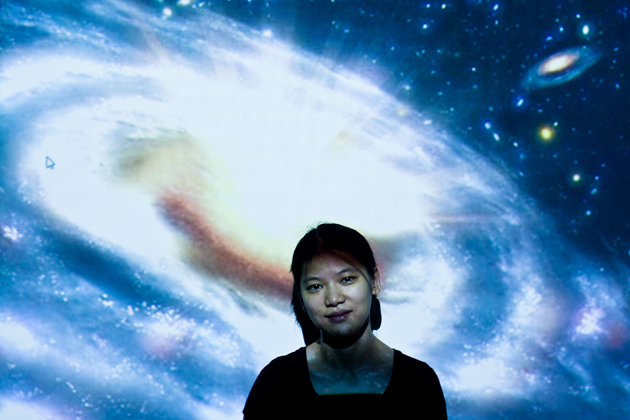The Faura AVR fits roughly a hundred people. Astrophysicist Dr. Reinabelle Reyes stands before an audience of physics faculty, administrators and a few enthusiastic students. She casually talks about the beginning and the end of the universe. Questions come in, left and right, which she answers calmly and simply, no matter how complicated or ludicrous.
She runs a simulation showing the Milky Way colliding with the Andromeda galaxy in a spectacular display of light. While some audience members are alarmed, she calmly explains that in all likelihood, the Earth will not be affected by the influx of celestial bodies into our galaxy. “It’s like a dance,” she says with a smile.
Lift off
When asked how she developed her passion for science, her answer has as much to do with the mind as it does with the heart. “The answer is ‘who,’ not ‘what,’ as is often the case when you trace the beginning of passions,” she says. “In this case, it was my first-year high school Earth Science teacher, now husband, who introduced to me the elegance of Physics and the pleasures of living ‘a life of the mind.’”
“Reina is not contented with whatever courses are offered,” says Dr. Quirino Sugon of the Physics Department, whom Reyes approached once for an extra two-hour lecture on geometric algebra when she was an undergraduate at the Ateneo.
“Astrophysics as a specialization came much later, in my PhD,” she says. This was after finishing her masters in high-energy physics at the Abdus Salam International Center for Theoretical Physics.
It was her PhD research at Princeton University that made the 28-year-old a star among her peers. Apart from discovering 900 black holes hidden at the centers of galaxies, she helped prove Einstein’s Theory of General Relativity on a cosmic scale, comparing observations on 70,000 galaxies to Einstein’s predictions.
Reyes has a way of making this elaborate research work look almost effortless. The truth, however, is different. “There are very few cosmologists in the country who understand the mathematics behind Dr. Reinabelle Reyes’ work,” says Sugon.
Worlds apart
Still, there’s more to the internationally celebrated astrophysicist than meets the eye. Reyes’ Filipino upbringing and Western education manifest themselves in her unique view of the world and life as a scientist. Reyes says, “This broad perspective keeps me grounded and grateful, and I’d like to think, wise beyond my years.”
An atheist, she sparked controversy in an interview with online news network Rappler where she stated that science “does make one more critical of religion” and that while she understood faith, she didn’t believe in a higher being.
Some Filipinos in online communities denounced her outright, while others celebrated her. In fact, Reyes was given the Science Award at the third Filipino Freethinkers Forum. At the forum, awards were given to Filipinos who have worked to further the organization’s causes: reason, science, and secularism.
In the Philippines, a place brimming with superstition, the Filipino Freethinkers promote secularism and discourse, devoting its time “to debunking myths, clearing up misconceptions and refuting outright misinformation.”
In her own way, Reyes has been doing just that by venturing into territory only very few have even tried to explore. “I’m honored. I’m humbled. I’m grateful and I’m inspired, inspired and excited about all the things we can do to bring science to the public,” she said in her acceptance speech.
Collisions
At her talk in Faura Hall, a light moment arises when the university president raises his hand to ask what happened before the Big Bang. Reyes laughs, saying she isn’t qualified to answer the question, but manages to respond nonetheless. She says most models put the Big Bang at time equals 0, but there are alternative models.
On her recent trip to the Philippines, she gave a number of talks in universities as well as in the Mind Museum in Taguig. While that audience at Faura was captivated, reception elsewhere isn’t always so avid. In fact, Reyes gave the same talk at a required Science 10 plenary with less than ideal results. Classic signs of student indifference were prevalent—texting, sleeping and chatting.
“There is a shortage of appreciation of these kinds of things, especially here in the Philippines,” notes physics junior Chi Punzalan. “We usually think of science as difficult or just hard to understand, so we lose interest.”
This is where Reyes comes in. Sugon says that when she was in the Philippines, “she met everyone whom she can talk to—those in the academe, industry, and government—on the state of science in the country. ‘Where is the best place to teach? Where can we get funding for research?’ She wants to know more. She wants to know what she can [to] do more.”
“I’m always aware, sometimes painfully, that science, together with art and self-actualization, comes last in Maslow’s hierarchy of needs,” Reyes says. Still, she continues working to discover, as well as educate.
The great unknown
By some accounts, the universe is expanding faster than the speed of light. All the galaxies in the universe are getting so far away from each other that eventually, the light from their stars won’t even reach us here in the Milky Way.
Dr. Reinabelle Reyes could be considered lucky that she was born into a generation that still has distant galaxies to study. She has dedicated the better part of her career to understanding the world around us, albeit thousands of light years away.
We ask why she chooses to study the universe despite the distance and the fact that it one day will be too far away from the Earth to even see. She gives a tenacious, intrepid response: “Why study the universe? I say, why not? Or, to invoke the oft-quoted answer to the question, why climb Mt. Everest? Because it’s there. To which I’ll add, because we can.”







